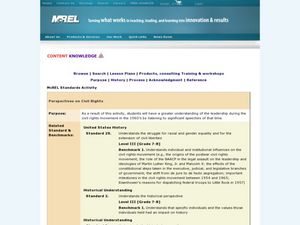Curated OER
Violence Prevention
Compare and contrast the ideologies of Malcolm X and Martin Luther King, Jr. Middle schoolers conduct research regarding civil rights and rhetorical strategies used in political speechs. They examine the strategies that both men employed...
Curated OER
Researching Equality and Justice
Choosing from a list, researchers investigate topics that range from the women in the American Civil Rights movement to the quest for equal rights in Iraq and Afghanistan. Although the plan is not detailed, a link to a PBS site that...
Curated OER
The Language of the Civil Rights Movement:
Tenth graders study the poetry of the US Civil Rights movement and the Black Arts movement over a 12 day period. They author a website showing works of poetry that students have chosen to analyze and relate to these movements.
Albert Shanker Institute
Strategizing for Freedom
Booker T. Washington, W.E.B. DuBois, Marcus Garvey, and A. Philip Randolph developed different views on how to advance civil rights for African Americans. Class members research these famous figures and their strategies before developing...
Albert Shanker Institute
The March on Washington Logistics Then and Now
I have a dream ... that all pupils will be able to organize a march of their own after learning about how Bayard Rustin organized the 1963 March on Washington for civil rights. Young reformers work collaboratively examining informational...
Stanford University
Martin Luther King, Jr. and Malcolm X: A Common Solution?
Much has been made of the differences between Martin Luther King, Jr. and Malcolm X. But was there any common ground between them? Class members reconsider what they think they know about these two civil rights leaders with biographical...
Curated OER
Land, Liberty and the Struggle for the American Dream
Students investigate equality by reading a historical fiction book in class. In this civil rights lesson, students read the story Roll of Thunder, Hear my Cry with their classmates and define the Jim Crow Laws that kept blacks...
Curated OER
History in Literature - The House of Dies Drear
Hook your learners with a great project. They research the underground railroad and civil rights movement through literature, view the video The Underground Railroad: Escape from Slavery, and read the book House of Dies Drear in their...
Curated OER
Perspectives on Civil Rights
Students examine speeches of the Civil Rights Era. In this American history lesson plan, students listen to speeches delivered by Martin Luther King, Jr. and John F. Kennedy. Students respond to guiding questions as they listen to the...
Curated OER
Art: Faith Ringgold Story Quilts
Twelfth graders examine the impact of African American culture on the United States by inspecting Faith Ringgold's story quilts. Working in groups, they create a collective story quilt about current cultural issues. They research their...
Curated OER
Breaking Barriers with Melba Pattillo
Young scholars are introduced to individuals who made the civil rights movement a success. They examine, analyze and interpret the events and people who had a significant and stirring impact on the course of history through stories,...
Curated OER
Civil Rights Leaders; Past and Present
Students explore the concept of social justice. In this Civil Rights lesson, students fulfill the Rubric for Historical Research requirements as they conduct research on a Civil Rights or Anti-Apartheid Movements leader.
DocsTeach
Analyzing Jackie Robinson's White House Letter
Jackie Robinson: A hero on and off the field. An eye-opening activity focuses on Jackie Robinson's social activism during and after the civil rights movement. Academics read a letter addressed to President Nixon, answer questions, and...
PBS
Breaking the Code: Actions and Songs of Protest
Ezell Blair, Jr., David Richmond, Franklin McCain and Joseph McNeil changed history. Their sit-in at the lunch counter of the Woolworths in Greensboro, North Carolina on February 1, 1960 became a model for the nonviolent protests that...
Albert Shanker Institute
Who Was Bayard Rustin?
Who was Bayard Rustin? Pupils analyze a series of primary source documents to learn about this important figure in the civil rights movement. The lesson contains a short film to watch along with guiding questions and other resources...
Digital Public Library of America
The Watsons Go To Birmingham—1963 by Christopher Paul Curtis
A primary source set of photographs, videos, newspaper articles, and FBI reports provides insight into race relations during the 1960s, the Sixteenth Street Baptist Church bombing, and the murder of Emmitt Till. Designed to be used to...
Stanford University
Observing Human Rights Day
How much intervention is appropriate for America to take in cases of human rights violations? Class members ponder a question that has lingered since the birth of America with a series of primary sources that reflect the degree to which...
Curated OER
Melba Pattillo and Ruby Bridges: Two Heroes of School Integration
Learners put themselves in the shoes of students who integrated Little Rock High School in 1957-58. Note: The primary resources in this activity provide powerful and poignant descriptions of what those students faced.
Curated OER
The Right to Remain Resilient
Learners examine the Civil Rights Movements in the U.S., both current and historic. In small groups students investigate a specific civil rights group, create an illustrated timeline, noting key events, people, and state and federal laws.
Curated OER
Martin Luther King Jr. and Nonviolence
Using the book, Martin's Big Words, learners will discover the life of Dr. Martin Luther King Jr. Vocabulary is identified throughout the story by using several his famous protest speeches as examples. Class discussions on racism, during...
PBS
March on Washington: A Time for Change
Young historians conclude their study of the events that lead up to and the planning for the March on Washington. After examining videos and primary source documents, they consider the civil rights objectives that still need to be...
Curated OER
Understanding Martin Luther King Jr. Day
Third graders explore civil rights by researching the late Dr. King. In this African American leader lesson, 3rd graders read the book Martin's Big Words which explore the foundation of Dr. Martin Luther King Jr.'s principals and...
Learning for Justice
Mary Church Terrell
Excerpts from an 1898 speech by civil rights activist Mary Church Terrell offers young scholars an opportunity to investigate how Black American women fought for civil rights long before Rosa Parks and the civil rights movement of the...
Freeology
Martin Luther King, Jr.'s "I Have a Dream"
Dr. Martin Luther King, Jr.'s speech "I Have A Dream" is hailed as one of the most eloquent and moving speeches of the 20th century. But what makes his words hit his listeners' ears in just the right ways? Young orators study Dr. King's...

























